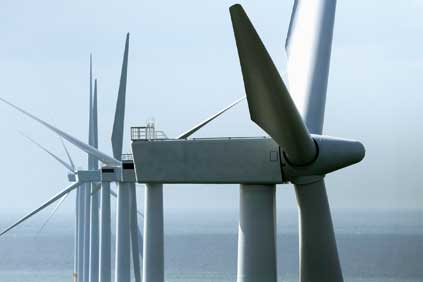"Although there are some outstanding issues in terms of finance and some ongoing legal issues, the momentum has clearly shifted, and we expect that Cape Wind will move forward," said Dan Shreve, a director at research company Make Consulting.
Cape Wind and Siemens finalised a deal in December that will see the German turbine maker supply 101 of its 3.6MW turbines — in line with the project’s signed power purchase agreements — with an option to add another 29 units to bring the facility to its full planned capacity of 468MW. Siemens will also install an offshore transformer and provide service and maintenance to the multibillion dollar project over the next 15 years. Installation and commissioning is expected for 2016, Siemens said. Financial details were not disclosed.
Shreve expects the turbine supply agreement will prove key to allowing Cape Wind to qualify for hundreds of millions of dollars in federal tax credits, a subsidy he views a critical to the successful completion of the project.
The US government’s 30% federal investment tax credit (ITC) expired at the end of 2013 and has yet to be renewed, meaning that only projects that began actual construction or spent 5% of the project’s total capital costs by the end of the year can receive it. If the full 468MW project is built at an estimated cost of $2.6 billion, that figure would equal roughly $130 million.
Cape Wind spokesman Mark Rodgers said the company expects the project will qualify under the 5% threshold, although he declined to provide further details.
Despite the progress, gaps remain before construction can begin. Cape Wind has yet to finalise its financing, although Rodgers said it expects to have funding in place in the second or third quarter this year.
Siemens has said it will likely take an equity stake in the project, although the company's US office would not comment further. Danish pension fund PensionDanmark conditionally agreed last year to provide the project with a $200 million mezzanine loan and remains committed to the project, said Christian Skakkebæk, senior partner at Copenhagen Infrastructure Partners, which manages the fund through which PensionDanmark is investing in Cape Wind.
"The project is progressing well and expects to qualify for ITC for a significant part of the invested capital. We are keen to see the project being realised and reaching financial close later in 2014, but there is still some work to be done before our mezzanine loan commitment of $200 million can be made unconditional," Skakkebæk said.
PensionDanmark’s continued interest is positive, said Shreve. "I feel it should provide other potential investors with a greater level of confidence and help push the project financing discussions to completion," he added. A positive outcome on Cape Wind’s pending application for a federal loan guarantee would go a long way to finalising the project financing, Shreve said.
Further ahead, there are further hurdles. Cape Wind is facing four challenges of the environmental approval it received from the Department of the Interior, which were consolidated into one proceeding before the US district court in Washington, DC. An appeal has also been lodged against the Federal Aviation Administration's determination of no hazard from the project, the fourth such ruling the project has received since 2002.

.png)


.png)










